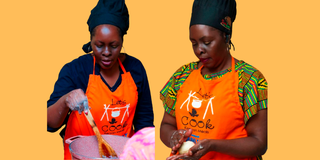
Pamellah Oduor prepares meals at her home in Nairobi. She runs Let's Cook Kenyan Meals, a Facebook community.
“East or West home is always best.” For Kenyans living in the diaspora, this is a statement they understand all too well. Besides longing to be with the families they left behind, they must also contend with foreign food, which their palates are not used to.
Many, if not all, wish to carry a bit of home with them as they travel. Kenyan chefs have capitalised on this desire for Kenyan food in the diaspora, leading to the rise of ‘cloud kitchens’. A Cloud kitchen is a commercial kitchen that solely prepares and delivers food, with no dine-in seating, and Kenyan chefs running these businesses are tapping into the diaspora market, preparing and shipping Kenyan delicacies abroad.
Meet Pamellah Oduor. The former bank manager resigned in 2015 to pursue her passion for cooking. At first she ran an on-site restaurant and would get opportunities to prepare meals for various events. But then Covid-19 struck, and life as we knew it changed.
“When I started, we would be called to prepare meals for weddings, cater for corporate events and bridal showers. Then, after Covid, there was a shift in the market. Client numbers went down. Right now, we don’t have many people holding large weddings, and even events are fewer compared to before. I decided to change my business strategy and cater for the new market, which wanted food deliveries mainly in their homes,” she tells Lifestyle.

Pamellah Oduor prepares meals at her home in Nairobi. She runs Let's Cook Kenyan Meals, a Facebook community.
It was during this time that she learned about the Kenyans traveling abroad who wanted to carry homemade Kenyan foods. However, her dream for the Kenyan food industry had long been in the kitchen (no pun intended).
“In 2018, I was part of the Facebook Leadership program because I run a Facebook community. During the program, one of the projects I worked on was looking into how I could ensure that Kenyan food reaches the rest of the world. The group is called Let’s Cook Kenyan Meals, and I founded it 12 years ago to create employment for youth and women. My aim was also to make people view food as a source of income,” she said, adding, “In earlier years, people did not see being a chef as something to be talked about publicly. I wanted to show people that being in the food industry could be just as prestigious as having a career in any other field.”
Today, Let’s Cook Kenyan Meals has over 2.5 million members, a community Pamellah says forms a large part of her client base as the group has chefs and potential clients.
Demand for chapatis
“When we were doing home deliveries, I started receiving requests from people travelling abroad to prepare meals for them to carry. The most common food for Kenyans is chapati. Kenyans have a natural inclination towards chapati. Many of my clients ask me to prepare chapati, chicken and mboga kienyeji (traditional greens). Now there is also an increasing number of people who want samosas,” Pamellah explains.
Currently, many of Pamellah’s clients are those living in the diaspora.
How is the food delivered? The business woman tells us that the majority of the operations are done through WhatsApp chats, and a lot of trust goes into it.
“Many clients reach out to me through the phone number that I put in my socials, they place their order then send in their money. I prepare the meals then we use relatives or friends of the client who are travelling to the diaspora to deliver the food to the client. Other times when people visit their families in Kenya they carry food with them as they travel back,” he explains.
She continues, “We make the food in advance and freeze it. It is up to the client to identify someone they can trust to deliver the food to them. Food is very sensitive. You just cannot entrust it with anyone. We have not yet reached a point where we can send the food as a package to the people abroad,” she continues.
Pamellah explains that they do not use preservatives in their food.
“Putting preservatives in the food defeats the whole purpose. Many Kenyans who ask us to deliver food to them already complain that in the diaspora, they are taking too many preservatives. Once the food is frozen, I put it in cooler bags, and when it arrives, they can just put it in the freezer,” she explains.
She adds that many of her clients ask for around “100 or 200 chapatis. The whole tilapia is also one of their favourites, and many people ask for around 10 deep-fried fish and between five and 10 prepared chicken meat.” Many of Pamellah’s clients are Kenyans living in the United States, the United Kingdom, Hong Kong, Qatar, and France.
There is another booming market for Kenyan chefs where Kenyans in the diaspora hire them to prepare and deliver food to their kinsmen in the country.
“People in diaspora have always wondered how they can be part of the family celebrations here at home. Now, we are the link between them and their families. You find that many of them order food for their relatives here in Kenya. For instance, there are those who have their children in boarding schools here in Kenya. Many order food from me, which I deliver to their children.”
Peak season
Pamellah says there is no distinct peak season when it comes to their business, as it all depends on when a person will travel out of the country to deliver the food. “Our peak season is not certain. For instance, this past December was a peak season for us (chefs) because many of our clients from abroad wanted us to cater for their families here; preparing and providing food for them. There are good times when we have more orders than we can handle. An order can cost as low as Sh20,000, which is usually a combination of chapati and fish,” she says.
Pamellah’s highest order has been from a client in the United States who asked for 200 chapatis, 300 samosas, 10 chickens, and 20 fish.
Continuous flow of clients
Miriam Wacera has been running her cloud restaurant, Asili Eateries, for some time now.
“Initially, I only dealt with traditional foods such as sweet potatoes, arrowroots, and porridge, however, I knew that I could do better. I wanted to explore more because I know how to cook good food. Since the physical restaurant was small, I closed down the business and started cooking from home in 2022.”
Miriam’s love for cooking stems from childhood.
“I enjoyed cooking ever since I was a child. In high school, I took Home Science and focused mainly on cooking. My then Home Science teacher pushed and nurtured me. After high school, I went to college and took a course in catering and hotel management.”
Now, Miriam is one of the Kenyan chefs who is reaping from the gold mine in the diaspora. She says that tapping into the market has not been difficult.
“Starting off was not very difficult. I joined Let’s Cook Kenyan Meals Facebook Group and that is how I started getting clients. I sell a lot to clients in the United Kingdom and the United States. In a good month, I can get about three to five clients asking for food to be delivered to them. There are many Kenyans contracting me to deliver food in offices and even to their families and parents in the rural areas,” the 39-year-old says.
Her highest order came in December when one of her clients in the United States asked her to prepare and pack 400 chapatis. She explains how the food is packed.
“Most of my clients want samosas, chapatis and dry chicken. Many request that we freeze the food. Others prefer to carry the food hot because, for many, the journey is short, probably 18 hours. Even when the food goes unfrozen, none of my clients have ever complained of the food having gone bad. We pack them in normal carrier bags and then put them inside ziplock bags to keep the food safe and fit into the luggage.”
How much does it cost?
Charges depend on the number of flour packets.
“For chapatis, I charge Sh1,250 per flour packet. A packet can produce around 25 pieces of chapati. This is the cost for plain chapatis. If I am adding some ingredients such as carrots, butternut, or making brown chapati, then I charge Sh60 per piece,” Miriam says of the business helping her raise her three children.
The rising demand for traditional greens

Dorcas Arasa, a chef and owner of Mpenda Ngano Kitchen, prepares food at her home in Nairobi, Kenya.
Dorcas Arasa has always loved making wheat products.
“I started cooking in 2019 when I was laid off from the cleaning job that I was doing. I decided to take a leap of faith and founded Mpenda Ngano Kitchen. I chose this name because I love working with wheat, mainly pastry,” she explains.
Dorcas tells Lifestyle that most of her clients are now those in the diaspora “either asking me to prepare food for them or wanting me to prepare food for their families here in Kenya.”
Many of her clients are from the USA, UK, Australia and Dubai.
“Most clients ask for traditional greens such as sagaa, kunde, managu. They also want samosas, a lot of chapatis, and mandazi,” she says.
Regarding costs, Dorcas charges Sh1,300 per flour packet and Sh500 per packet for the traditional greens.
She points out that sometimes, when there is plenty of work, she subcontracts to other chefs.
“In the Facebook group, we have managed to build relationships with other chefs. When one person gets a large order, they subcontract one of the other chefs they trust,” she says.
cgichuki@ke.nationmedia.com









